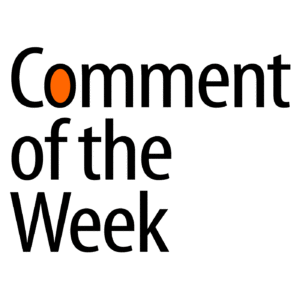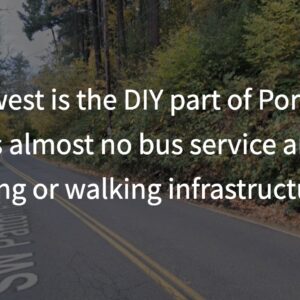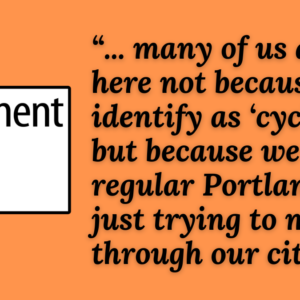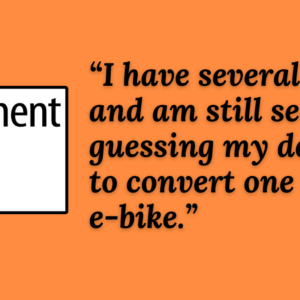
I had to flip a coin this morning. Because it’s not ten comments of the week, or two, it’s just one.
Friday’s story about BikeLoud PDX’s decision not to protest the removal of the bike lane on Northeast 33rd Avenue continued the avalanche of strongly-felt opinions about this PBOT screw-up. Maybe you think the issue has already been adequately hashed out. But you might have missed a comment that came in Sunday afternoon, one of the most insightful perspectives on Portland I’ve read.
Here’s ITOTS’s take on how our city handles some racial conversations:
“This time, that conflict happened on NE 33rd, but it is not an isolated instance, and is in fact an ongoing experience for our neighbors of color, particularly Black people.” — BikeLoud PDX
This phrase emerged in the last few years, but we need to get even more specific here, because as lovely as it is to “center” black voices, that’s not a specific enough description of who is experiencing these conflicts negatively. Reversing this project doesn’t center black voices and doesn’t provide a pathway to resolve these kinds of conflicts (when they actually are substantive) in the future.
Once again for the people in the back (or the ones in the front who are hard of listening): the black community is only a monolithic community insofar as it has been and continues to be treated as such by culture, discussion, and policy. Viewing black people as all somehow alike led to and justified slavery, Jim Crow, housing discrimination, urban renewal targeting, financial discrimination, and the war on drugs. Doing it here doesn’t help us parse the situation and how to address it and similars.
Portland’s struggle to understand and constructively work with black people is actually due to the fact that there aren’t enough black people in Portland to interact with for everyone else to organically recognize there is no black community; there are many. And that black perspective and opinion is just as fractured and varied as that of the people any other demographic box is drawn around. Asking a random group of black people what they think about bike lanes or the government and expecting a coherent answer to emerge is just as absurd as expecting a coherent answer to emerge from a group of white people.
For every black person that takes each slight, mistake, omission, turn of phrase, or look from a stranger and places it into the context of just another example of a racist society or system, there’s another black person that connects all those events differently and tells another story about their lives and how other people relate to them, e.g. a racist government chasing a black family out to the edge of the city and trying to push them out vs. a city organization screwing up, failing to follow its own notification procedure for a run-of-the-mill project.
It’s irresponsible and unhelpful to give any oxygen to that first way of viewing the world when an action is not actually part of the trend and neither PBOT nor BikeLoud should be going out of its way to do so. You can validate feelings and worldview while still communicating the facts of the situation — the plan, the function, the normalcy* of the action in the city context, the slip up, the remorse — and that, despite the feelings of some individuals, because in reality this action doesn’t uniquely or disproportionately target black people, isn’t part of some system-wide decades-long strategy to make it hard for black families to live in Portland, and it’s normal and okay for projects to create some inconvenience, the project is moving ahead, or in this case, staying put.
Yep it’s a complex and challenging message to deliver, but it’s honest, honors all interests, and PBOT needs to learn how to deliver it.
Or it can keep showing black people that if they evoke their membership in a racial group vs. as a disgruntled individual on a street of people of many identities, they can stop anything they don’t like.
*It’s very likely that in projects outside these higher profile bike v Black Portlander moments (Williams, 7th, 33rd), the city inconvenienced 100s of black households through parking removals for bike lanes, bus lanes, and curb extensions without anyone knowing because those individuals chose not to characterize public works projects that are visible coming online across the city as racist acts specifically targeting them when the same changes sprout up in front of their house.
Thank you ITOTS. You can read the comment in context of the full thread here. (Don’t miss the comment just below by Portland Bicycle Mapper who made an arcGIS map to explain himself!)
Thank you to everyone who contributed comments this week. If we had a “Thread of the Year” selection, several threads this week would be in the running.







Thanks for reading.
BikePortland has served this community with independent community journalism since 2005. We rely on subscriptions from readers like you to survive. Your financial support is vital in keeping this valuable resource alive and well.
Please subscribe today to strengthen and expand our work.
great choice, Lisa! This comment is so insightful and articulates so well what has been irking me about PBOT’s handling of this project and the 7th greenway project.
Yuck. This isn’t what’s happening in this town. Full of dog whistles, this comment. And totally the kind of thing that white people want to hear.
Kiel’s comment was right on, and honestly I was proud of him for it. Denying systematic racism in Portland is not the path to progress.
I wonder if Mr. Maus and the folks at BikeLoud and within PBOT can really comprehend what this comment is saying. Politics and policymaking that center group identity like race, religion, ethnicity, nationality, gender etc inevitably lead to twisted logic pretzels and circular firing squads. This time it only led to a bike lane removal, but this kind of deficient thinking can create much worse public policy outcomes and debases the humanity of individuals.
PBOT should center the practical needs of individuals who are likely to use the 33rd Ave right of way and how people who choose to bike, walk, and drive can all do so as safely as possible. People who cry racism when a bike lane is installed should be ignored unless they can come with some serious receipts, and the city needs to make clear that it owes no one a free spot to park their private motor vehicle.
Is the commenter Black? The race of the speaker matters a lot in these situations, since a person’s credibility is based on Lived Experiences.
Let’s say the commenter was black, would that make specific parts of the comment more valid? Would it make “joan” feel differently about her “Yuck.” comment above?
And now, what if they were not black? Which parts of this comment change for you? Is it no longer applicable to the situation on 33rd, or Portland’s transportation system more broadly?
This is self-serving, but I believe it’s relevant.
From my comment the other day:
I was careful to write that PBOT avoids “being called racist,” not that PBOT avoids “racist actions.”
Even though PBOT staffers might very well agree with ITOTS’s very astute observation about the diversity of Black opinion, the simple fact of at least one Black constituent accusing the agency of institutional racism is sufficient to cause a lot of concern, no matter what policy preference the individual is linking to that charge.
Furthermore, using the Kendi framework (racial disparities in policy outcomes are evidence of racism) to determine policy can be really tricky. It can be really difficult to know, definitively, whether policy A or policy B is better for Black people.
For example, it might actually be racist to make the street network less safe for vulnerable road users, because that might have a disproportionately negative effect on Black people. To show this, you’d need years of traffic injury and fatality statistics, and maybe some kind of control condition. Getting a strong statistical signal would be tough in a town with, as ITOTS points out, relatively few Black people.
Compare the difficulty of actually choosing a demonstrably antiracist policy, with the immediate and high-profile accusation of racism: if you have Black neighborhood residents speaking against street safety improvements on the local news, it sure appears racist to build those safety improvements over their objections!
Few people could stomach being called a racist, even if they’re working toward an anti-racist policy goal. Just think about it: the outcry is loud and current, while the effects of that policy goal will be revealed only far in the future, buried in traffic injury/fatality statistics that the public won’t likely see trumpeted on the 6pm news. That resolution might even occur after many staffers have left the agency for one reason or another.
It’s no wonder “being called a racist” would be a stronger motivator than “make anti-racist policy.”
When the two are in conflict (as I believe is true when it comes to Black neighborhood opposition to street safety improvements), it is easy to see how local agencies get scared out of actually making anti-racist policy.
This is a depressing incentive structure.
This comment is spot on and frames the issue very well. The conflicts that arise when public agencies try to undo past harms are extremely common in public health policy. The elimination of active transportation and leisure in marginalized neighborhoods as well as the direct negative impact of motorized vehicles is a public health crisis that has been thoroughly documented over the past century.
Unfortunately, PBOT and others in transportation circles appear to have approached these issues from square one, being “appease the loudest voice in the room” instead of seeking out expertise.
Similarly, many people in Portland who were newly drawn to social justice issues jumped onto a jingoistic bandwagon and shouted down wholistic improvements so that they could enjoy the immediate gratification of “stopping” something. Ten years ago this type of naiveté from PBOT and active transportation activists was understandable as they were making a sincere effort to understand these dynamics. But now, to be stuck in this same place, making the same mistakes, and to see activists also stuck in this same place is extremely disappointing.
On the other hand, to be sympathetic to PBOT, they have not been funded or equipped to create a strong public health message and address this problem in a similar way to something like, covid vaccine acceptance. The depressing part is that it doesn’t seem like PBOT or activists know where they are or the path forward even though they are surrounded by professionals with tons of experience.
Folks can “care” as hard as they can and even more than anyone else, but if at the end of the day, the effect of their actions kills and harms more people, they have failed. Even worse, they probably stood in the way of people who could have made things better.
It’s probably worth pointing out that the Kendi framework demonstrates that this country is strongly racist in favor of Asians, even at the expense of white people. If you don’t accept that conclusion, the whole framework falls apart.
Yeah. I should be clear that I’m using that framework as an example of one way one might try to prove that a certain policy isn’t racist. I don’t personally sign on to it in its entirety.
I think, for instance, it’s valuable to look at racial disparities in traffic injury/fatalities, because that might give PBOT ideas as to how to reduce overall impact.
In the case Asian American economic data, I have a number of Japanese American friends who were raised in concentration camps; to claim that they’ve been the beneficiaries of state racism is an insult.
Likewise, analyzing the policy of federal student debt forgiveness with this framework just leaves a muddle. Billions more dollars would go to white people, and fairly well-to-do white people at that!
Here’s a link:
https://policiesforaction.org/blog/who-benefits-blanket-student-loan-forgiveness
In the case Asian American economic data, I have a number of Japanese American friends who were raised in concentration camps; to claim that they’ve been the beneficiaries of state racism is an insult.
Really? Sorry but how many Asian American friends in their 90’s do you have? You’re talking about WW2 concentration camps right?
“Really? Sorry but how many Asian American friends in their 90’s do you have?”
Internment began in February of 1942, and, off the top of my head, I have at least four Japanese American friends who are at least 82 years old. (One was born in early December of 1941, in a hospital in Seattle with all its windows covered, in fear of another Japanese attack).
Why should that be unusual? What kind of assumptions are you making about me or the kinds of people I’d have as friends?
I would also add this (from opinion article in the NYT’s by Pamela Paul). In my opinion Kendiism is a simplistic reductionist philosophy. Unfortunately it seems many have accepted it blindly without any personal investigation.
More interesting is that many major universities, corporations, nonprofit groups and influential donors thought buying into Kendi’s strident, simplistic formula — that racism is the cause of all racial disparities and that anyone who disagrees is a racist — could eradicate racial strife and absolve them of any role they may have played in it.
After all, this reductionist line of thinking runs squarely against the enlightened principles on which many of those institutions were founded — free inquiry, freedom of speech, a diversity of perspectives. As one Boston University professor wrote last week in The Wall Street Journal, that academia backs Kendi’s mission amounts to a “violation of scholarly ideals and liberal principles,” ones that betray “the norms necessary for intellectual life and human flourishing.”
Frankly, using the “Kendi framework” is part of the problem.
https://www.nytimes.com/2023/10/05/opinion/ibram-x-kendi-racism.html
https://www.wsj.com/articles/how-ibram-x-kendi-broke-boston-university-academic-freedom-progressive-fb92d525
https://www.bostonglobe.com/2023/09/25/opinion/ibram-kendi-bu-center-for-antiracist-research/
I wasn’t clear: I don’t personally endorse his methodology in its entirety, but was using it as an example of one way a PBOT staffer might try to “prove” that an action is anti-racist.
The fact that two commenters have critiqued my mere mention of this methodology is further evidence that it’s easier for PBOT to avoid the appearance or accusation of racism than to actually avoid racism itself.
It’s easier for someone to say “that’s racist” than it is to prove that some policy is anti-racist.
I didn’t intend to critique your use of the term, only to point out that, like many pseudo-scientific belief systems, it leads to some absurd conclusions.
Sadly the powerful white people of Portland have black people exactly where they want them. To be forever be used as political pawns. And for the others, we don’t need saviors no matter how much “good” you think you are doing.
I’m confused by what white people are supposed to do? I’ve seen many black protestors with “silence = violence” signs, but when white people try to help, it’s “we don’t need white saviors”. So what can white people do, besides raise their kids to not be racist jerks? I’d like to be helpful without being seen as a wanna be savior.
The problem is that there’s no right answer. Everyone will tell you differently what you should or shouldn’t do.
Sounds like you are doing great with your family and you should just continue to do what you think is the right thing to do.
Sometimes the best way to help is not to “help”.
“No good deed goes unpunished” is not a common saying for nothing.
That answer will be different for everyone. Some basics I’ve come to understand are: stay humble, get comfortable being uncomfortable, embrace that wrangling with this stuff in Portland in just going to be messy and hard sometimes, keep an open mind, always learn new things and educate yourself about people and history of where you live… those are just a few.
Can I add one?
Take a long, hard, three-in-the-morning look at your own motives.
Rereading this I realize this sounds like it is directed at you, Jonathan, it’s not.
What I mean is not easily expressible on an internet board, I’ll give it a shot. We all often have more than one motivation for our actions and opinions. I have found it helpful to be as honest as possible with myself about why I do/say what I do.
One of the things I like about the new districts is that they encourage people to consider their own interest, rather than speaking for another set of people. That other set of people can speak for themselves, and ranked choice voting in multi-member districts give those voices a better chance of being heard.
Well, I personally have the best interest of all people at heart, and it just so happens that their best interests align with my policy preferences.
SARCASM 🙂